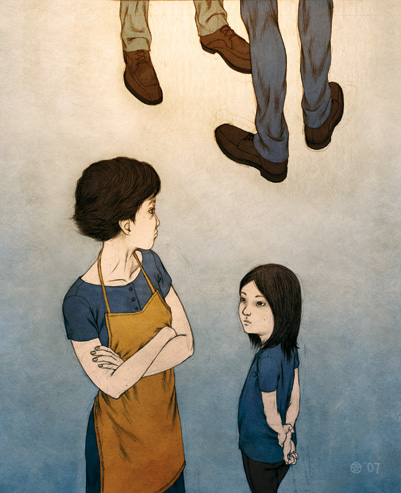written by REGINA APIGO
illustration by IAN KIM
As I peeked at the adults in the living room, I thought, Silly Mr. Morrow. Why is he saying everything to Appa? Doesn’t he know Umma makes all the decisions?
Mr. Morrow was our real estate agent. He was telling my dad how to make our two-bedroom house more sellable. Appa nodded his head vigorously. The agent hardly looked in my mom’s direction. Umma stayed silent except to encourage Mr. Morrow to eat the peanuts, dried squid and sliced apples.
I was only 8 then, but I knew where the unstated power in our family lay. Yet Mr. Morrow didn’t catch on. And how could he?
Everyone has a public face that differs somewhat from the private self. I was privy to both sides of my mom. Mr. Morrow had access to only one.
Ultimately it was my mom who would decide what improvements would be made to the home, when we would sell the home, for what price she would part with it and where we would move to.
From the big, to the small, Umma always had her say. She chose whether we ate at the Korean mall or McDonald’s. She banished Appa from wearing a plaid outfit to church in favor of a dark suit. She determined what school grades she expected of my sister and me.
In financial matters, it was no different. Umma found which type of insurance to buy for the home and the family store. She decided when money would be spent for improvements to the family store. Or how money should be saved or invested.
At home, with just us, Umma was and still is very animated. She resembles a sports commentator with her running stream of opinions.
“Ayy, another Alzheimer’s halmeoni,” she’ll say as we watch a Korean soap. “Why do they always have so many Alzheimer’s grandmas?”
At theaters, in my company, she will get upset at the violent content of movies, saying she doesn’t understand why American movies give “the crazies” more ideas. She rails against injustices, such as the killing or injuring of Korean-store owners that gets little press outside the Korean newspapers.
Yet you wouldn’t know that from the person she morphs into outside our nuclear family. She grows quiet among white Americans, whether it’s the real estate agent, banker, waitress or grocery clerk. But she grows even quieter among traditional Koreans. Instead of chatting, she fades into the kitchen, although she doesn’t relish being there (practically a crime for Korean women of her generation). It’s Appa who enjoys cooking fish soup, firing up thinly sliced beef on the table grill and marinating vegetables. He’s the one who mixes vinegar, sesame oil, garlic and red pepper paste to good results. He too might be committing a Korean crime, doing so-called “women’s work.”
Yet with the Korean visitors, it’s Umma who shuttles nearly invisibly, back and forth from the kitchen to the table with trays of bean sprout soup, kimchi, rice and side dishes. Her head, usually held up, seems heavy and drawn to the ground.
Her voice rises femininely at least an octave and turns from a boom to a whisper. After everyone eats, she clears the table and washes the dishes as her guests talk. She might encourage people to “eat more, eat more,” but she doesn’t give her opinions or defend herself from insults.
“Ahh huuut,” my uncle will say with his disapproving grunt as he surveys my mom’s food with disdain. “Why can’t you cook better?”
One time when Appa told my uncle that Umma had gone to the hospital for chest pains, my uncle lectured my mom on the virtues of Pepto-Bismol. He went to some lengths to describe what the pink stuff was and how and when to take it.
She used to be a pharmacist! She knows what Pepto-Bismol is, I screamed inside.
Yet my mom does not respond back. She just takes it all in. She is virtuous and yamjeonhae — demure. What I consider her beautiful spirit is dampened in favor of what others consider acceptable outside our immediate family. This mom is sadly foreign from the feisty Umma I know at home.
Maybe what makes me mad is that I see the same characteristics in myself. I am the type who fires off angry letters to politicians who claim that sending sexually explicit emails to interns is merely, “being overly friendly.” I will fax letters to the head of a business asking for the reinstatement of a fired columnist. I will write stories about injustices I see and submit them to publications. But I too have a hard time speaking out in public, even during a school meeting for my children.
Umma and I both have fire inside of us, but among certain crowds, we become quiet and yamjeonhae in a way I know we are not in private.
___





